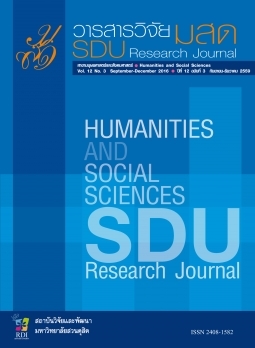การวิจัยและพัฒนาฐานข้อมูลเครื่องมือวัดการเรียนรู้และคุณลักษณะอันพึงประสงค์ ของผู้เรียน
Keywords:
Database, Students’ Learning Assessment Tool, Desirable CharacteristicAbstract
This research aimed to 1) synthesize students’ learning and desirable characteristic
assessment tools, 2) develop students’ learning and desirable characteristic assessment
tools database and 3) evaluate the use of students’ learning and desirable characteristic
assessment tools database. Exploration of theses in Educational Measurement and
Evaluation Program in the Faculty of Education, Chulalongkorn University during B.E.2532
to B.E.2557, provided 66 theses used in this study. Research instruments utilized were a
thesis synthesis form and usability evaluation form. PHP language was used to develop the
database which can be searched through an online system. Descriptive statistics was used
to analyze the data. It was found that most of the developed tools were designed to
measure only a single domain which had 54 cases (81.22%). Affective domain had the
most number of tools in the development which had 31 cases (40.90%). The analysis
result according to the domain and the content validity revealed that 29 affective domain
tools were validated by using content validity IOC the most (39.73%). The analysis result
according to the domain and the reliability analysis revealed that 19 affective domain
tools were validated by using reliability with Cronbach’s alpha coefficient the most
(55.88%). Finally, the result from database evaluation indicated that data characteristics
had high satisfaction with a four-point scale (M = 3.29, S.D. = 0.59), database website
characteristics had high satisfaction with a four-point scale (M = 3.35, S.D. = 0.61),
and overall satisfaction had high satisfaction with a ten-point scale (M = 8.16, S.D. = 1.40)
as well.
References
มหาวิทยาลัย.
โชติกา ภาษีผล. (2555). องค์กรแห่งความสุขที่มีคุณภาพของ ส.ส.ท. : การพัฒนาตัวบ่งชี้และโมเดลความ
สัมพันธ์เชิงสาเหตุ. วารสารวิธีวิทยาการวิจัย, 25(2), 143-162.
Elmasri, R. & Navathe, S. B. (1994). Fundamentals of Database Systems (2nd ed.). California,
CA: Benjamin-Cummings.
Lapanachokdee, W., Lawthong, N. & Piyapimonsit, C. (2016). Critique on Thai Educational
Research Methodology. ASEAN Social Science, 12(3), 93-111.
Miller, L.A., Lovler, R. L., & McIntire, S. A. (2013). Foundations of Psychological Testing: a
Practical Approach. (4th ed.). California, CA: Sage Publications.
Moor, A. & Weigand, H. (2001). Towards a Semiotic Communications Quality Model. Paper
presented at The IFIP TC8 / WG8.1 Working Conference on Organizational
Semiotics: Evolving a Science of Information Systems, The Netherlands, 23 – 25
July 2001, 278-285.
Walvoord, B. E. (2004). Assessment Clear and Simple: A Practical Guide for Institutions,
Departments, and General Education. California, CA: Jossey-Bass.
Translated Thai References
Kanjanawasee, S. (2009). Classical Test Theory. (6th ed.). Bangkok: Chulalongkorn University
Press. (in Thai)
Pasiphol, S. (2012). TPBS’s Happiness and Quality Workplace: A Development of Indicators
and Causal Relationship Model. Journal of Research Methodology, 25(2), 143-
162. (in Thai)








